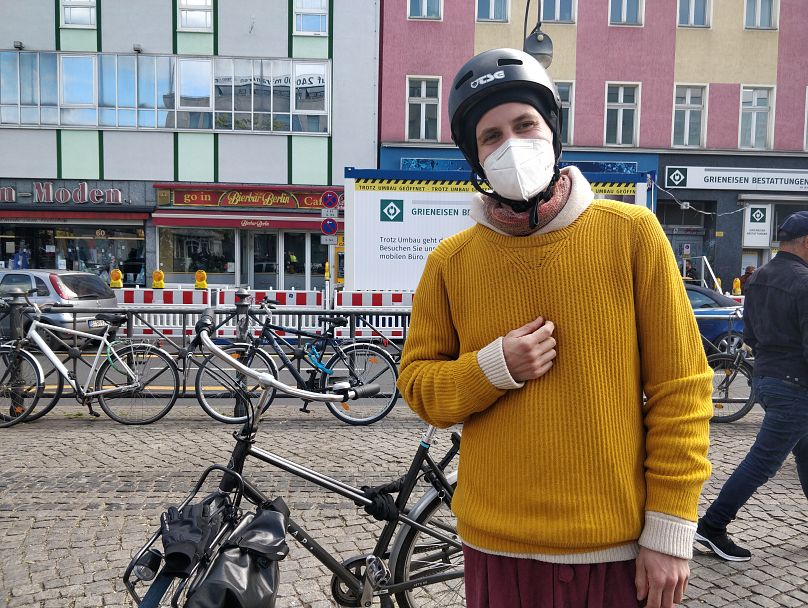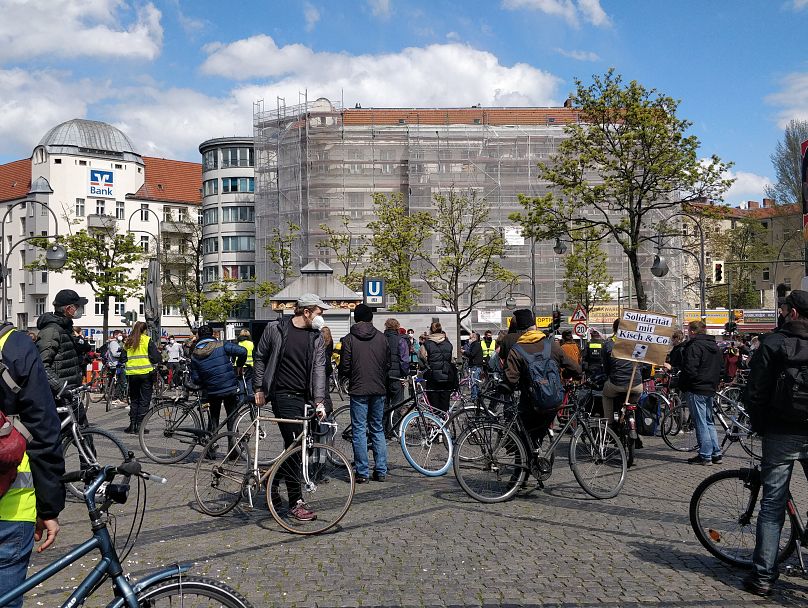A ruling earlier this month overturned a law that had capped rents in a bid to make the German capital more affordable.
The timing couldn't really have been worse for hundreds of thousands of Berlin tenants.
A ruling earlier this month overturned a law that had capped rents in a bid to make the German capital more affordable.
It means as Berliners struggle with the economic impact of the pandemic, some are being hit with the double blow of demands for backdated rent and future increases.
One of them is Adam Jelski.
He moved into a new two-bedroom apartment four months ago. He faces an arrears bill of €800 and a hike in rent of €200 a month from May.
“A €200 monthly increase in rent is quite a lot of money for one person," he told Euronews. "I’m still awaiting a letter from my landlord. I have only been living there for four months, so the past money is not a problem, but the future money is."
With his job contract ending in June, Adam may be staring at an uncertain future financially, especially if his unemployment stint stretches on for months.
Like thousands of other Berliners, he is questioning whether he will be able to afford to stay in his current apartment.
Berlin’s controversial rent cap law came into effect in February 2020, introducing a rent freeze at June 2019 levels for a period of five years.
Katrin Lompscher, Berlin's housing minister when the law was introduced, said the move was driven by inaction by central government on the matter. She said in a press statement that the ambition was to make housing affordable for everyone.
When Germany's constitutional court overturned the law earlier this month, Sebastian Scheel, Berlin's current housing minister, said it was now the task of the federal government “either to create an effective rental price law that ensures the social mix in the cities or to transfer the competence for this to the states".
That doesn't help the Berliners struggling to make ends meet.
Rodrigo, a resident of Berlin borough Neukölln, admits the revoking of the city’s rent cap law does not put him in great financial difficulty.
“This is a law that not many of us demanded at the time," he said. "The state introduced it and now we are facing this challenge. It’s the state’s responsibility to intervene and pay the landlords.”
Polish-native Justina is a freelance artist who has been living in Berlin since 2017.
“I am renting a one-room apartment which is quite expensive, mainly because I didn’t have any other option," she told Euronews. "So this rent cap law directly impacts me. Most of what I earn used to go in paying the rent. Because of the rent cap, I was paying €150 less each month.
"I am a freelance artist finding it really hard to get work during this pandemic and I couldn’t rent a studio, so my apartment basically doubled-up as one. Now it seems like a beautiful dream has come crashing down.”
Just a week after the court’s April 15 decision, Justina has already received a letter from her landlord demanding the back payments. However, like several others, she hopes that an agreement can be made to pay the money in instalments and not as a one-time payment.
With the rent cap law struck down, Alisa* (name changed) owes nearly €2,500 to her landlord as back payments. Added to the regular rent, the software engineer is looking at a considerable amount of money to find.
“My rent went down by €500 when the rent cap was implemented. We did keep aside the money, in case the law gets overturned. Considering this pandemic situation, I am also very lucky to keep my job. But despite all that, it's still a huge amount of money to pay back and this is all madness,” she said.
Freelance artist Markus, who has been living in his apartment for the past six years, says with the pandemic limiting his job prospects, the financial strain of increased rent is a challenge.
“Jobs are going down in this situation and now our rents have shot up. For a freelancer like me, this has put me in a difficult situation,” he said.
Berlin’s department for urban development and housing says 1.5 million apartments are affected by the rent cap law.
Everyone in private rentals is impacted by the law, but those in government-owned social housing and apartments built after 2014 are exempted.
Two housing companies -- Vonovia and Heimstaden -- have said that they will not be demanding the back rent from their tenants.
Housing firm Deutsche Wohnen said it will “offer a whole range of options for settling the balance of the rent due: from one-off payments to instalment payments and deferments”.
In the wake of the financial situation many tenants find themselves in, the Berlin Senate has offered financial aid under its "Safe-Living Help", in the form of loans and grants. Authorities are also appealing to private housing firms to not demand the back payments immediately.
Meanwhile, an initiative called Deutsche Wohnen und Co enteignen calling for the expropriation of private housing firms that own more than 3,000 apartments in the city is fast gaining momentum. Since February this year, the campaign is collecting signatures from tenants for a referendum to call on Berlin’s government to pass a law that will "renationalise" a part of private housing; an initiative Berliners have placed faith in.
Every weekday at 1900 CEST, Uncovering Europe brings you a European story that goes beyond the headlines. Download the Euronews app to get an alert for this and other breaking news. It's available on Apple and Android devices.













